- Home
- Stephanie Laurens
The Capture of the Earl of Glencrae Page 3
The Capture of the Earl of Glencrae Read online
Page 3
“Mmurgh!” She tried to kick at him, to no avail.
“Wait.” Smoothing down her skirts, he rose; her feet slid to the floor. “If you’ll allow it, I’ll retie your wrists in front of you. Otherwise you’re going to be rather uncomfortable until I get you into my house.”
She glared at him, but, as before, that had less than no effect. She was still trying to make sense of what was happening, as if her wits were still catching up with the action. She couldn’t imagine what he was about; he was supposed to be her hero.
When he simply stood, staring down at her and waiting, making a grumbling, grudging sound—one promising hellish retribution—she swung on the seat and presented him with her bound hands.
He bent over her. She tensed, waited, but in untying her wrists he gave her no chance to wrench one free and strip away her gag; he was large enough, his arms long enough, to reach over and around her. One of her hands in each of his, he brought them forward and retied them even more securely, wrapping and trapping her fingers in the folds of her shawl.
Bah! How the devil was she to get out of this?
Presuming she wanted to get out of this.
The errant thought struck with such disconcerting force that she was momentarily distracted.
Long enough for the fiend to lift down a carriage blanket from the rack above her head, shake it out, solicitously wrap it about her shoulders . . . then he swept her knees up and sideways, tipping her lengthwise onto the seat.
She shrieked, then futilely fought as he ruthlessly wrapped her securely in the blanket, then settled her on her side on the seat, rolled and trussed, her arms held down, her legs straight. “Va-a-ou-ouing?” From her ignominious and utterly helpless position, she scowled blackly up at him.
He stood towering over her, his head bent because he was too tall for the carriage; he looked down at her for a moment, then calmly—in that deep, utterly sinful voice—said, “If you have the slightest sense of self-preservation, you’ll stay as you are. Once the coach starts to move, as it will in a moment, if you try to wriggle you’ll end on the floor. I’m sending you on to the mews behind my house—it’s not far. I’ll rejoin you there as soon as I can.”
He was leaving her? “Wrr-rar-rou-rooing?”
“Back to the soiree. I’ll leave once your disappearance has been noticed and enough people see me still there.” He looked down at her for a moment more, then turned to leave. “Trust me,” he said. “You’ll be perfectly safe.”
He stepped down from the carriage and closed the door.
Straining her ears, she listened to him speak to his coachman. She couldn’t distinguish the direction he gave—that damned voice of his was so smoothly deep—but she heard the coachman’s reply.
“Air, m’lor.”
She froze. Aye, my lord. Except that wasn’t how it had sounded.
The coachman was Scottish. And not from anywhere civilized, like Edinburgh, but from the wilds of Scotland.
A coincidence?
Primitive sensation swept over her nape.
The carriage rocked, then rumbled slowly off. Her mind abruptly racing in a dozen directions, she barely registered the turn out of the narrow alley into a larger street.
Black-haired, large, a nobleman. A face like hewn granite and eyes like ice.
But it couldn’t be. The laird was dead. He’d fallen off a cliff and plunged to his death. They hadn’t found his body yet, but . . .
And Debenham was well known among the ton. He wasn’t Scottish . . . yet she knew several Scotsmen who spoke perfect, unaccented English.
Debenham was known to have a badly damaged knee. No one had mentioned the laird limping along with a cane . . . but Debenham had left his cane on the terrace, and she hadn’t noticed him limping as he’d trapped her and carried her to the carriage.
And his eyes . . . she wouldn’t have said they were cold, not as she’d seen them, but she could imagine that, if he so wished, their expression might grow chilly . . .
She dragged in a strangled breath. She could barely believe what her wits were screaming.
She’d been kidnapped, possibly by the laird.
Definitely by her hero.
Chapter Two
The carriage rocked and rattled over the cobbles. Angelica lay on the seat, grappling with the realization of what had just happened. Of what was happening now.
She dragged in a breath, held it, then wriggled and fought furiously against the restraining blanket.
It eased not at all; her fiendish captor had tucked the ends in tight. The carriage rolled around a corner, and his prediction nearly came true; flinging herself back, she only just saved herself from falling off the seat.
Abandoning all thought of immediate escape, she huffed out a breath, lay still, and tried to think. Tried to decide what was what, so she could then decide what to do.
She’d been kidnapped by a man who bore a striking resemblance to the supposedly dead laird, the mysterious nobleman behind her older sisters’ kidnappings. Heather had been kidnapped first, then several weeks after Heather had escaped, Eliza had been snatched from inside St. Ives House. Angelica tried to imagine what Heather and Eliza had felt on realizing they’d been captives. Shock, horror, terror, fear—some combination of those?
Studying her own roiling emotions, all she could find was anger, in several shades, some of it directed at herself, various threads of incredulity and disbelief, and beneath all else an incipient feeling of betrayal. Debenham was her hero, yet he’d trussed her up like a package and stolen her away. Just the thought sent her temper spiraling. If he truly was the laird come back to life, then, as she’d warned him, he would pay.
The carriage turned ponderously again, and the light from the streetlamps faded. Darkness closed in. Tipping back her head, she shook her hair off her face and peered out of the window in the nearer carriage door. The carriage slowed, then halted, settling on its springs. Eyes adjusting, she saw a shadowed wall of old stone.
Debenham had said his house wasn’t far; given the very short distance the carriage had traveled, he’d spoken the literal truth, and said the house was near Cavendish House, which in turn was just around the corner from Dover Street. She had to be within minutes of her home.
The coachman and groom remained on the box, quietly talking. She listened, but couldn’t make out their words.
Debenham had said the carriage would take her to the mews behind his house, that he would come to fetch her after her disappearance from the soiree was noted.
She’d gone to Cavendish House with her mother, Celia, her aunt Louise, and her cousin Henrietta. Given the crowd in the salon and the nature of the gathering, she doubted any of the three would notice her absence until they were ready to depart; only then would they look for her.
Which meant she had at least an hour in which to decide how to react to Debenham when he reappeared.
Should she be frightened?
No matter how deeply she dredged, she couldn’t find any fear. Even in those minutes when he and she had wrestled beneath the trees, she hadn’t been afraid. Shocked and furious, yes; fearful, no. At no time had her instincts, until that night invariably reliable over alerting her to men with undesirable intentions, detected any threat emanating from Debenham; they had detected what she’d read as sexual interest, but no threat.
She thought back to the moment she’d first seen him, when he’d been watching her so assessingly . . . she inwardly squirmed. She’d interpreted his interest in her as personal, while he’d been studying her as a target.
Ouch. She grimaced around the gag, felt heat warm her cheeks. How embarrassing.
His disapproval of her forwardness now made sense; he’d seen her as a flighty, mindless, tonnish miss taking an incomprehensibly stupid risk. She’d all but thrust herself into his arms and invited him to make away with her.
/> That didn’t mean he had to take me up on it.
But he had, which meant there was something wrong somewhere. She’d only acted with such brazen boldness because she’d been beyond convinced that he was her hero. But he couldn’t be her hero and be her kidnapper as well. That’s impossible. I refuse to accept that I’m fated to fall in love with a kidnapper. No. Either he’d made a mistake, or she had.
Decide whether to be afraid, first. She thought back over all he’d said, compared that with what she’d learned of Heather’s and Eliza’s kidnappings; in both instances, the laird had ordered his henchmen to take excellent care of their captives.
Debenham had assured her several times that he intended her no harm of any kind. Closing her eyes, she replayed his words, carefully considered his tone. He’d been absolutely sincere. More, even though he’d ruthlessly subdued her, bound her, carried her off, and placed her in his carriage, she doubted she’d sustained so much as a bruise. Even now, while she wasn’t exactly comfortable, she wasn’t in pain, not even true discomfort.
Not physically. Mentally . . . she was in a state, something she rarely, if ever, endured.
She was angry, confused, and curious. While the first and the last were widely regarded as her besetting sins, confusion was not something she normally indulged in. Confusion had no place in her world, a world she managed, organized, and ruled. Confusion meant a lack of knowing, and she always knew—what she wanted, what she felt, how her life should be.
Her confusion lay entirely at Debenham’s feet.
He couldn’t be her hero. She tried to tell herself that her instincts had been wrong, that The Lady’s charm had failed. That somehow the signs had been twisted or corrupted. She reminded herself that he hadn’t responded to her in any encouraging way—she might have thought at the time that he had, but that had just been him leading her on . . .
The minutes ticked by as she lay in the dark and argued with herself.
She had no idea how much time had elapsed when she finally gave it up as a lost cause.
Her instincts remained unmoved, her confidence in The Lady and her talisman unshaken. She knew exactly what she had known when she’d set out to arrange an introduction to Debenham. Nothing that had happened since had altered that knowledge or changed the unassailable conviction stemming from it.
He was her hero.
Which meant that everything else was wrong.
All right. Lips thinning behind the gag, eyes narrowing, she nodded. So I’ll wait until I learn what this is all about, and then I’ll change it. Change the situation, change him. Remake him if necessary. Whatever it takes, he will be my hero.
She’d always hoped securing her hero would be a challenge; it appeared she’d got her wish.
So. She blew out a breath. No fear, not unless I discover some reason to be frightened. I’ll find out what’s going on and go forward from there. As The Lady and I aren’t wrong, then there has to be a way, and clearly it’s up to me, and entirely in my best interests, to find it.
Debenham had said that he would explain all. Once he did, she would take charge.
She settled to wait. Waited.
Waited some more.
Where the devil is he?
She’d reached the point of muttering dire imprecations when the coachman and groom abruptly fell silent, then the carriage rocked as the groom jumped down. Stilling her tongue, she listened, yet she didn’t know Debenham was there until he opened the carriage door. For such a large man, he moved all but silently.
She stared stonily at the dark silhouette that was him, all but filling the doorway. “Ou-t-u-tine.”
He looked at her for a moment, then climbed into the carriage. “Matters took longer than I’d hoped. Your family didn’t leave until nearly the end of the soiree, then I was waylaid by a friend as I left.” He slid one large hand, then his arm, beneath her, and hefted her up.
Still wrapped like a mummy, she bit her tongue and held still as he maneuvered her out through the door.
When he had her free of the carriage, he hoisted her over his shoulder.
“Mmph!” Wriggling furiously, she glared down the long length of his back.
His arm tightened about her legs, trapping them against his chest. “Just wait. I’ll carry you into the house and untie you there.”
She recognized his tone. His voice was even deeper, but he might have been one of her brothers talking to some female they were resigned to protecting.
Resigned?
Her temper boiled again.
A corner of the blanket had fallen over the back of her head, but she could see to either side. As Debenham started walking, she glimpsed the coachman and groom, but they were merely shadows in the gloom.
Debenham ducked and carried her through a gate in a high stone wall into what appeared to be an extensive back garden. She looked about, trying to get some idea of where his house was. What she saw didn’t definitively answer the question, but from the areas she glimpsed—kitchen garden, small orchard, various outbuildings, paved courtyard outside the back door, with raised gardens of lawns and shrubs stretching to either side—this was one of the old mansions still to be found in some of London’s best streets.
The restricted glimpses she caught of the house confirmed that; old carved stonework surrounded the windows, and the house rose three stories and more above the rear gardens, its massive bulk outlined against the night sky.
She was still deep in the heart of the ton.
Both Heather and Eliza had been whisked directly out of London, but neither had been kidnapped by the mysterious laird himself. Angelica was increasingly certain that the broad shoulder over which she lay belonged to that elusive nobleman.
She was looking forward to the moment when he removed her gag.
He carted her into the house via the back door. The huge room beyond was warm, comfortable, and well lit. Chairs scraped; the instant Debenham walked into the light, exclamations erupted from several throats.
“Merciful heavens! Is that her?” A woman with a Scottish accent.
“I thought you were planning on just looking tonight.” An older man, also Scots.
“The countess’s rooms are ready, my lord.” A much more refined individual, not, Angelica thought, Scottish. “The candelabra are lit—I thought you might wish to view the refurbishing.”
“Good. Miss Cynster and I will talk up there.” Her captor handed something—his cane?—over, then proceeded to walk through the room.
Angelica caught fleeting glimpses of the three she assumed were members of his staff—a neatly dressed maid, an older man whose attire suggested he was a majordomo, and a short, slightly rotund individual who bore all the hallmarks of a gentleman’s gentleman, and now held the cane. All three looked surprised, but pleased, positively happy that their employer was returning from his evening’s entertainment with a kidnapped lady wrapped like a package and slung over his shoulder.
Debenham ducked through another door and into the corridor beyond; as the servants’ hall fell behind, Angelica frowned. What the devil was going on? He’d kidnapped her and his staff thought that was wonderful?
Were she to attempt an escape, clearly she could count on no assistance from them.
Debenham pushed through a swinging door and continued into a large front hall. She saw a wealth of fabulous paneling, impressive Jacobean doorways, arches, and leadlight windows, but all were wreathed in dust and cobwebs, suggesting that the house had been closed for years. Reaching the bottom of a massive staircase, Debenham turned and started up. He didn’t seem to even register the extra weight of her, riding like a rolled rug over his shoulder.
He stepped onto a wide landing, turned left, and went up another flight. The balustrade was of dark, heavily carved wood; everything she saw—the table on the landing, the ornate flambeau flanking it—was of excellent qua
lity, but outdated. Long out of fashion.
Gaining the first floor, her captor turned into a gallery, then paused before a door, opened it, and walked through. He turned to close it, allowing her a quick survey of the room. If what she’d seen of his house thus far had made her wonder, the elegance and expensive comforts of this room banished any doubt that Debenham commanded wealth as well as station.
Lit by two silver candelabra, the large room was a lady’s sitting room. A pretty chaise covered in gold-and-ivory silk sat facing a delicately decorated marble fireplace. The gold framed mirror above the mantel was huge, reflecting ivory silk wallpaper stamped with small gold fleur-de-lis. A mahogany writing desk sat before one window, a fine straight-backed chair before it. An enormous Oriental carpet in gold, browns, and cream covered the polished floor.
A door in the wall alongside the fireplace stood open, giving her a view of the room beyond and the massive four-poster bed it contained. She recalled the valet’s words. These were the countess’s rooms. Which presumably meant that there was, or had been, a countess, and the house was most likely still owned by an earl.
Two large armchairs upholstered in gold velvet sat on either side of the hearth. Debenham walked to the chair further from the door, stooped, then lifted her from his shoulder and sat her in the chair.
She shook the blanket back from her head and, ignoring the hair cascading over and around her face, glared at him.
His lips thinned. “Yes, I know. I apologize unreservedly for my methods, but bear with me.”
She let her expression convey her response: She didn’t have much choice.
He hesitated, then slowly, carefully, lifted the hair that had fallen over her face and smoothed the silky strands out of her eyes, off her cheeks. His fingertips touched, faintly brushed, her forehead, her cheeks, and she battled to suppress a sudden shiver of awareness.
Lips even more compressed, he reached around her, loosened the blanket, and began unwinding it. She shifted as required; between them, they unwrapped her. Finally drawing the blanket away, he tossed it behind the chair.

 Lady Osbaldestone’s Plum Puddings: Lady Osbaldestone’s Christmas Chronicles Volume 3
Lady Osbaldestone’s Plum Puddings: Lady Osbaldestone’s Christmas Chronicles Volume 3 The Beguilement of Lady Eustacia Cavanagh: The Cavanaughs Volume 3
The Beguilement of Lady Eustacia Cavanagh: The Cavanaughs Volume 3 Loving Rose: The Redemption of Malcolm Sinclair (Casebook of Barnaby Adair)
Loving Rose: The Redemption of Malcolm Sinclair (Casebook of Barnaby Adair) By Winter's Light
By Winter's Light Devil's Bride
Devil's Bride The Tempting of Thomas Carrick
The Tempting of Thomas Carrick![Cynster [22.00] A Match for Marcus Cynster Read online](http://i1.bookreadfree.com/i/03/16/cynster_[22_00]_a_match_for_marcus_cynster_preview.jpg) Cynster [22.00] A Match for Marcus Cynster
Cynster [22.00] A Match for Marcus Cynster All About Love c-6
All About Love c-6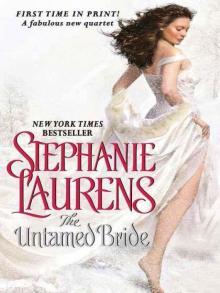 Cobra 01 The Untamed Bride
Cobra 01 The Untamed Bride A Lady of Expectations and Other Stories
A Lady of Expectations and Other Stories By Winter's Light_A Cynster Novel
By Winter's Light_A Cynster Novel And Then She Fell
And Then She Fell The Greatest Challenge of Them All
The Greatest Challenge of Them All The Edge of Desire
The Edge of Desire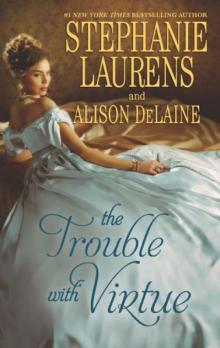 The Trouble With Virtue: A Comfortable WifeA Lady by Day
The Trouble With Virtue: A Comfortable WifeA Lady by Day Fair Juno
Fair Juno THE LEGEND OF NIMWAY HALL: 1750 - JACQUELINE
THE LEGEND OF NIMWAY HALL: 1750 - JACQUELINE Four In Hand
Four In Hand The Reckless Bride
The Reckless Bride Stephanie Laurens Rogues' Reform Bundle
Stephanie Laurens Rogues' Reform Bundle The Untamed Bride Plus Black Cobra 02-03 and Special Excerpt
The Untamed Bride Plus Black Cobra 02-03 and Special Excerpt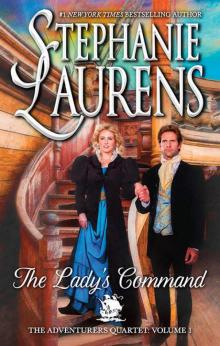 The Lady's Command (Adventurers Quartet #1)
The Lady's Command (Adventurers Quartet #1) The Seduction of Sebastian Trantor
The Seduction of Sebastian Trantor The Daredevil Snared (The Adventurers Quartet Book 3)
The Daredevil Snared (The Adventurers Quartet Book 3)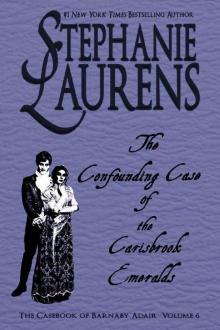 The Confounding Case Of The Carisbrook Emeralds (The Casebook of Barnaby Adair 6)
The Confounding Case Of The Carisbrook Emeralds (The Casebook of Barnaby Adair 6) Lord of the Privateers (The Adventurers Quartet)
Lord of the Privateers (The Adventurers Quartet)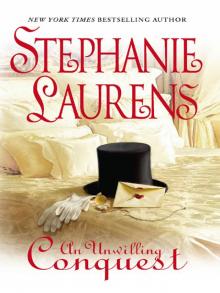 An Unwilling Conquest
An Unwilling Conquest Brazen Bride
Brazen Bride On a Wild Night
On a Wild Night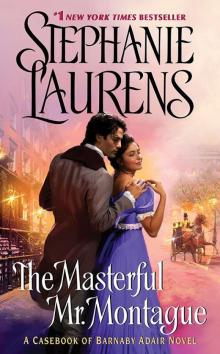 The Masterful Mr. Montague: A Casebook of Barnaby Adair Novel
The Masterful Mr. Montague: A Casebook of Barnaby Adair Novel Lord of the Privateers
Lord of the Privateers Royal Bridesmaids
Royal Bridesmaids Beyond Seduction
Beyond Seduction It Happened One Night
It Happened One Night The Ideal Bride
The Ideal Bride The Promise in a Kiss
The Promise in a Kiss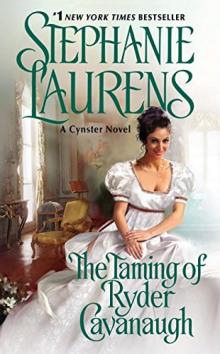 The Taming of Ryder Cavanaugh
The Taming of Ryder Cavanaugh The Ideal Bride c-12
The Ideal Bride c-12 All About Love
All About Love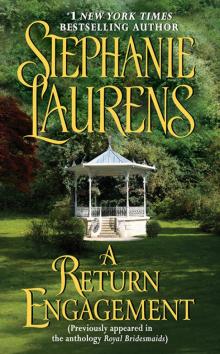 A Return Engagement
A Return Engagement The Untamed Bride Plus Two Full Novels and Bonus Material
The Untamed Bride Plus Two Full Novels and Bonus Material Viscount Breckenridge to the Rescue
Viscount Breckenridge to the Rescue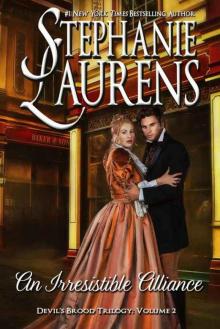 An Irresistible Alliance (Cynsters Next Generation Novels Book 5)
An Irresistible Alliance (Cynsters Next Generation Novels Book 5) The Daredevil Snared
The Daredevil Snared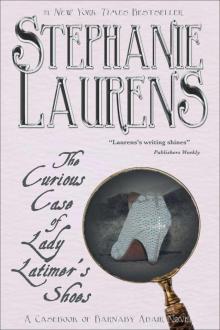 The Curious Case of Lady Latimer's Shoes: A Casebook of Barnaby Adair Novel
The Curious Case of Lady Latimer's Shoes: A Casebook of Barnaby Adair Novel A Lady of Expectations and Other Stories: A Lady of ExpectationsThe Secrets of a CourtesanHow to Woo a Spinster
A Lady of Expectations and Other Stories: A Lady of ExpectationsThe Secrets of a CourtesanHow to Woo a Spinster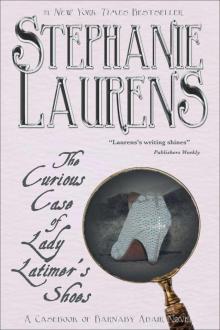 The Curious Case of Lady Latimer's Shoes: A Casebook of Barnaby Adair Novel (The Casebook of Barnaby Adair)
The Curious Case of Lady Latimer's Shoes: A Casebook of Barnaby Adair Novel (The Casebook of Barnaby Adair) The Truth About Love
The Truth About Love A Rogue's Proposal
A Rogue's Proposal The Elusive Bride
The Elusive Bride The Perfect Lover
The Perfect Lover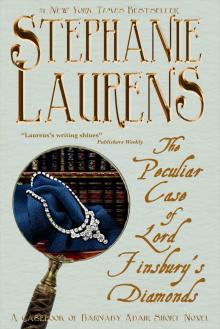 The Peculiar Case of Lord Finsbury's Diamonds: A Casebook of Barnaby Adair Short Novel
The Peculiar Case of Lord Finsbury's Diamonds: A Casebook of Barnaby Adair Short Novel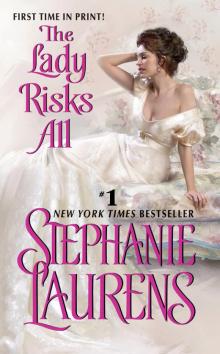 The Lady Risks All
The Lady Risks All The Murder at Mandeville Hall: The Casebook of Barnaby Adair: Volume 7
The Murder at Mandeville Hall: The Casebook of Barnaby Adair: Volume 7 All About Passion
All About Passion A Match for Marcus Cynster
A Match for Marcus Cynster By Winter's Light: A Cynster Novel (Cynster Special Book 2)
By Winter's Light: A Cynster Novel (Cynster Special Book 2) The Lady By His Side
The Lady By His Side The Pursuits of Lord Kit Cavanaugh
The Pursuits of Lord Kit Cavanaugh Tangled Reins
Tangled Reins To Distraction
To Distraction A Rake's Vow
A Rake's Vow A Comfortable Wife
A Comfortable Wife A Lady of His Own bc-3
A Lady of His Own bc-3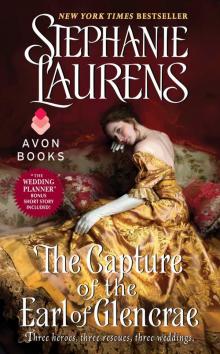 The Capture of the Earl of Glencrae
The Capture of the Earl of Glencrae Scandals Bride c-3
Scandals Bride c-3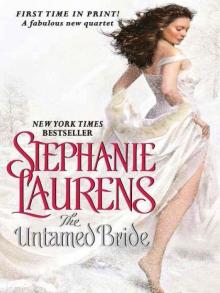 Untamed Bride
Untamed Bride The Brazen Bride
The Brazen Bride The Lady By His Side (Cynsters Next Generation Novels Book 4)
The Lady By His Side (Cynsters Next Generation Novels Book 4) Tangled Reins and Other Stories
Tangled Reins and Other Stories Impetuous Innocent
Impetuous Innocent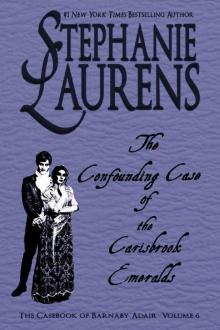 The Confounding Case Of The Carisbrook Emeralds
The Confounding Case Of The Carisbrook Emeralds Stephanie Laurens - B 6 Beyond Seduction
Stephanie Laurens - B 6 Beyond Seduction What Price Love?
What Price Love? A Fine Passion
A Fine Passion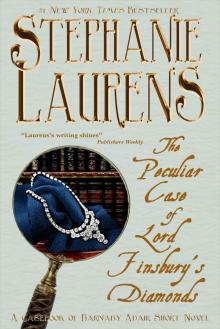 The Peculiar Case of Lord Finsbury's Diamonds: A Casebook of Barnaby Adair Short Novel (The Casebook of Barnaby Adair)
The Peculiar Case of Lord Finsbury's Diamonds: A Casebook of Barnaby Adair Short Novel (The Casebook of Barnaby Adair) Where the Heart Leads
Where the Heart Leads The Designs of Lord Randolph Cavanaugh
The Designs of Lord Randolph Cavanaugh A Secret Love c-5
A Secret Love c-5 On a Wicked Dawn c-10
On a Wicked Dawn c-10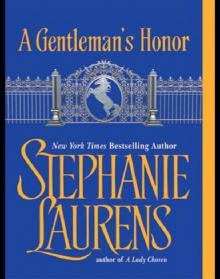 A Gentleman's Honor
A Gentleman's Honor THE LEGEND OF NIMWAY HALL_1750_JACQUELINE
THE LEGEND OF NIMWAY HALL_1750_JACQUELINE A Lady of Expectations
A Lady of Expectations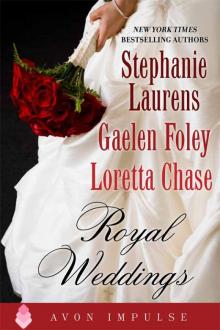 Royal Weddings: An Original Anthology
Royal Weddings: An Original Anthology The Ideal Bride (Cynster Novels)
The Ideal Bride (Cynster Novels) Mastered by Love
Mastered by Love A Buccaneer at Heart
A Buccaneer at Heart Captain Jack’s Woman / A Gentleman's Honor
Captain Jack’s Woman / A Gentleman's Honor Devil's Bride with Bonus Material
Devil's Bride with Bonus Material A Lady of His Own
A Lady of His Own A Secret Love
A Secret Love Melting Ice
Melting Ice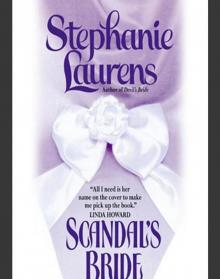 Scandal's Bride
Scandal's Bride Lady Osbaldestone’s Christmas Goose
Lady Osbaldestone’s Christmas Goose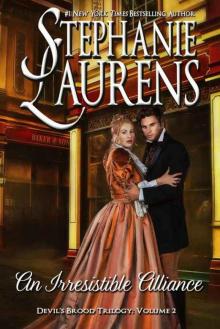 An Irresistible Alliance
An Irresistible Alliance It Happened One Season
It Happened One Season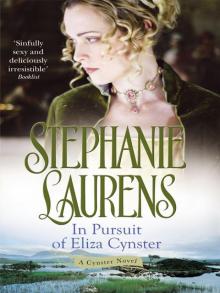 In Pursuit Of Eliza Cynster
In Pursuit Of Eliza Cynster Captain Jack's Woman
Captain Jack's Woman The promise in a kiss c-8
The promise in a kiss c-8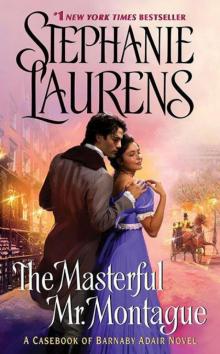 The Masterful Mr. Montague
The Masterful Mr. Montague The Lady Chosen
The Lady Chosen A Gentleman's Honor bc-2
A Gentleman's Honor bc-2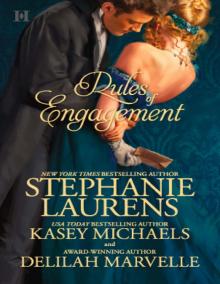 Rules of Engagement: The Reasons for MarriageThe Wedding PartyUnlaced (Lester Family)
Rules of Engagement: The Reasons for MarriageThe Wedding PartyUnlaced (Lester Family) Secrets of a Perfect Night
Secrets of a Perfect Night The Taste of Innocence
The Taste of Innocence On A Wicked Dawn
On A Wicked Dawn The Untamed Bride
The Untamed Bride A Rogues Proposal c-4
A Rogues Proposal c-4 Rakes Vow c-2
Rakes Vow c-2 Devils Bride c-1
Devils Bride c-1 Hero, Come Back
Hero, Come Back On a Wild Night c-8
On a Wild Night c-8 All About Passion c-7
All About Passion c-7